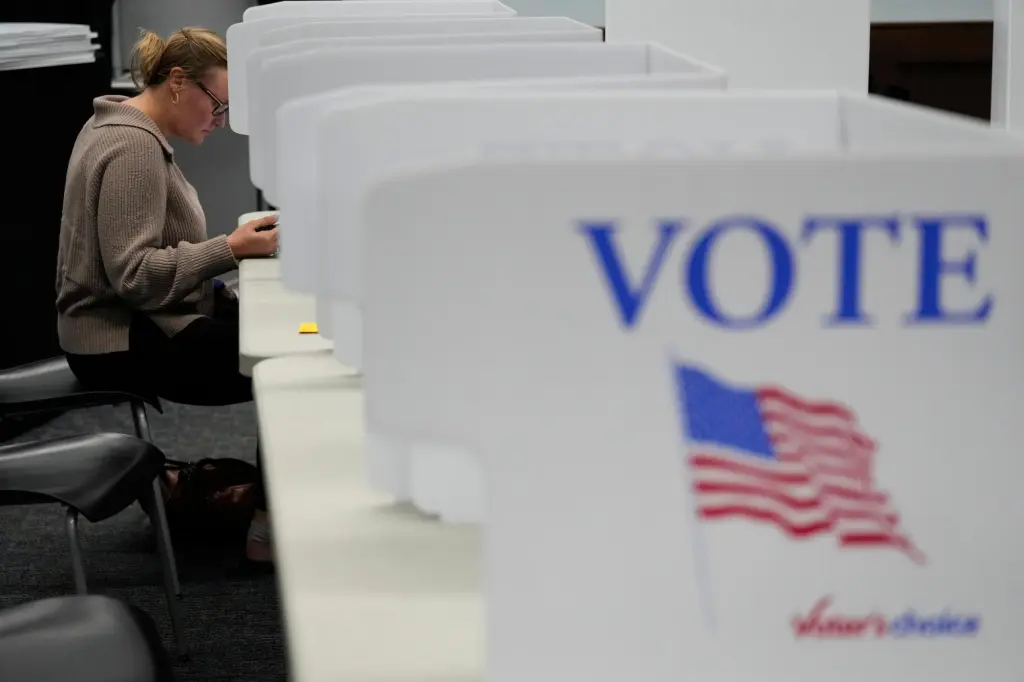
Fight Voter Fraud Inc., a nonprofit group based in Middletown, has filed dozens of unsubstantiated allegations with Connecticut officials in recent years claiming that thousands of people voted illegally in the state, forcing investigators to spend hours investigating and debunking the group’s claims.
But the group now has a powerful new ally in pushing its allegations about voter fraud: the U.S. Department of Justice.
In August, a high-ranking official from the DOJ forwarded information compiled by Fight Voter Fraud Inc. to the Connecticut State Elections Enforcement Commission and demanded that the agency look into the group’s allegations that roughly 14 people have voted more than once in recent elections.
The DOJ communications were sent to SEEC by Mac Warner, the Deputy Assistant Attorney General for the DOJ’s civil rights division.
Warner, who previously served as West Virginia’s Secretary of State from 2017 to 2025, has publicly claimed multiple times that the 2020 Presidential election was stolen from President Donald Trump due to actions by the FBI and CIA.
Warner’s communication with the SEEC sets up a unique situation, in which the DOJ is placing its weight behind allegations compiled by an organization that has been criticized in the past for repeatedly advancing unfounded claims based on its misinterpretation of voter registration information and other data.
Stephanie Thomas, Connecticut’s Democratic Secretary of the State, said this week that it was unnecessary for the DOJ to be forwarding allegations of voter fraud to the SEEC.
“Connecticut already has a system to investigate credible claims through our State Elections Enforcement Commission,” Thomas said in a statement. “Involving the U.S. Department of Justice in these preliminary allegations risks blurring the lines of that process.”
“Allegations are not evidence, and our voters deserve better,” Thomas added.
Linda Szynkowicz, the founder and CEO of Fight Voter Fraud Inc., did not respond to a phone call for this story.
And officials with the U.S. Department of Justice did not address how Warner came into possession of the complaints compiled by Fight Voter Fraud Inc.
A DOJ spokesperson also did not answer questions about whether federal officials independently investigated the allegations contained in the complaints prior to forwarding them to SEEC, or whether the federal government is asking other states to investigate similar claims of voter fraud from outside groups.
“The Justice Department is committed to upholding the integrity of our electoral system and will continue to prioritize efforts to ensure all elections remain free, fair, and transparent,” said Natalie Baldassarre, a spokesperson for the DOJ.
Clare Kindall, SEEC’s interim director, confirmed her agency received two memos from the DOJ in recent months requesting that state officials investigate allegations produced by Fight Voter Fraud Inc.
In the first case, Kindall said SEEC did not act on the communication because Fight Voter Fraud Inc. had previously filed the exact same allegations with the agency, and SEEC staff were already investigating the claims that 4,897 people may have voted more than once.
But the second memo, which was sent last month and included claims that another 14 people voted twice in recent elections, prompted SEEC to open a formal investigation this week.
“We take every allegation seriously, and we are handling this complaint within the normal course of business as we do with any other complaint,” said Kindall, who previously served as Connecticut’s Solicitor General.
“We traditionally have a very good working relationship with DOJ and all law enforcement,” she added.
The relationship between SEEC and the Fight Voter Fraud Inc. has been more fraught, however.
Following the 2020 presidential election, Szynkowicz sent SEEC more than 50 complaints alleging thousands of incarcerated people, unregistered adults and underaged teens voted illegally in Connecticut during the election between Trump and Joe Biden.
Those complaints required SEEC staff to devote a large amount of time looking into each allegation. Once those investigations were complete, SEEC took the uncharacteristic step of admonishing the group and its founder for wasting the agency’s time and resources.
“The Commission notes that, while significant commission resources were required to process and definitively disprove the allegations contained in these complaints, complainant could have avoided the waste of these resources if she had ascertained the requirements of the law and the meaning of the data she produced as evidence,” SEEC members wrote in one of the orders.
“The commission would strongly encourage those who hold themselves out as authorities on election law investigations to educate themselves on both the facts and law of the complaints they file with the Commission to avoid the needless waste of the limited investigatory resources of the Commission,” SEEC added.
Even after that reprimand, however, additional complaints from Fight Voter Fraud Inc. have flooded into the SEEC, and Szynkowicz has continued to earn nearly $200,000 per year leading the organization, according to IRS records.
The newest complaints from Fight Voter Fraud Inc. rely primarily on data showing that people are registered to vote in two locations, and the group uses that information to claim many of them voted twice.
But as the SEEC pointed out in past cases, people who move can be registered in two locations without casting more than one ballot during an election.
Rep. Matt Blumenthal, who leads the state legislature’s Government Administration and Elections Committee, said he found it odd that the DOJ was using its power and credibility to advance allegations from a group that has frequently made baseless claims about voter fraud.
“Anyone can submit a complaint or information which can predicate an investigation by the SEEC,” Blumenthal said. “But it is unorthodox that the U.S. Department of Justice would be submitting information.”
Blumenthal pointed out that the DOJ has the authority to charge people for double voting if they believe it occurred, and he questioned why the federal government was forwarding such allegations on to a state agency.
“The DOJ has immense investigatory powers and resources,” Blumenthal said. “If they had a reasonable basis for thinking these allegations were true, they would have the ability to investigate and prosecute it themselves.”



